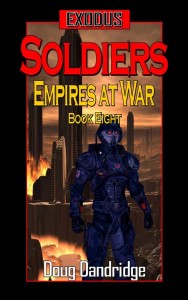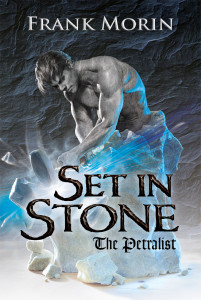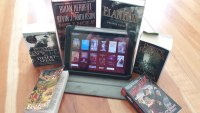A guest post by Doug Dandridge.
 I’m not sure if you can call me the world’s greatest expert on self-marketing. However, since I am closing in on 130,000 book sales in thirty-four months, I must be doing something right. I have made over $300,000.00 in that time period, and am a full time working author. In this blog, I will give a quick rundown on some of the things I have done. I will go ahead and plug a book I wrote which is available on Amazon called How I Sold 100,000 Books On Amazon. I’ve heard from some people who read the book and reported increased success. I don’t have time to go into everything in this brief essay, but will cover what I think are the most important points. Of course, most important is to write a book that a lot of people will want to read when you put it out there. But that is of no use if you can’t attract people to give it a try.
I’m not sure if you can call me the world’s greatest expert on self-marketing. However, since I am closing in on 130,000 book sales in thirty-four months, I must be doing something right. I have made over $300,000.00 in that time period, and am a full time working author. In this blog, I will give a quick rundown on some of the things I have done. I will go ahead and plug a book I wrote which is available on Amazon called How I Sold 100,000 Books On Amazon. I’ve heard from some people who read the book and reported increased success. I don’t have time to go into everything in this brief essay, but will cover what I think are the most important points. Of course, most important is to write a book that a lot of people will want to read when you put it out there. But that is of no use if you can’t attract people to give it a try.
Establish a web presence. You want your name, not just the name of your book, to take up the top slots in a Google search. There are several things I did here. First, I established a web site, with a lot of outgoing links, which hopefully will help generate more incoming links. This will raise it up in the search algorithms. Next I established a blog. I was able to get domain names for both blog and website that were my name, dougdandridge, one with a .com, one with a .net. I went on Amazon and Goodreads and rated a hell of a lot of books I had read, and left actual reviews for most of them. Blog when you can. It doesn’t have to be daily, and don’t just blog on how people can buy your book. Blog on things of interest around the topics of your books. I do blogs on armor, modern and future weapons, tropes, movies, all kinds of stuff, and then also do a couple of blogs, with excerpts, whenever I put out a book. And don’t let the number of subscribers put you off. I only have about a 150 subscribers, but my blog, published about every other week, gets hundreds of views a day. That’s because I also tweet the blog, with hashtags, and post it on a number of Facebook pages frequented by people interested in fantasy, scifi or ebooks in general. Also do blogs for other people when asked, and ask them if they don’t get around to it. I have done blogs for people like David Farland, and for people who have less than fifty subscribers. I feel like it is a reciprical effort, helping both parties. The result is that I have the top twenty slots on Google for Doug Dandridge now. When I started out I was on page two with one entry, and there aren’t that many Doug Dandridges out there to compete with.
Advertise your other books in each of your books, with hyperlinks to make it easy for readers to get to them. I also have a newsletter, which, while it has slightly less than 300 subscribers, has a much better than average opening rate. The newsletter is probably responsible for a couple of hundred early sales of each book, driving them up the genre charts, which gets even more attention. Reviews are important, probably as much as anything. Not actually what they said, but how they rate you, and the average of those ratings. Do not buy reviews. Repeat, do not buy reviews. But if anyone compliments you, on Facebook, your blog or by email, ask them if they will give you a review. One review I got was a three star for another series, but he complimented me on my Exodus series, and I asked him is we would be kind enough to write a review for one of those books. I got another five star review out of that transaction.
I got started with Amazon giveaways. I have given away almost 16K ebooks, and several of those giveaways have driven my sales. The trick is to not just do the giveaway, but to advertise those dates. I use Author’s Marketing Club, which has a free page where you can visit sites that let you advertise your free book. Most of the sites are free, some charge a nominal fee, but it’s worth it. You also blog and tweet the giveaway. How well have they worked? In September of 2012 I gave away 4,100 copies of The Deep Dark Well, a book which has sold almost 6,000 copies since. When I released the first of my Exodus: Empires at War books, it started flying off the Amazon servers. In May 2014 I did a giveaway of that very Exodus book, just after releasing book 6. I gave away 4,900 copies of book 1. The five Exodus books were selling between fifty and a hundred books a month at that time. After the giveaway, each volume sold over five hundred copies in May, including the one I had just given away. Over two thousand books, for over six thousand dollars in royalties. Cha ching. So they are still useful, if done properly.
Twitter is a big part of my platform. And twitter doesn’t work well at all when you’re just starting out. What I did was join an indie author’s site, Independent Authors Network, and started retweeting the tweets from some of their most followed authors. Eventually I was tweeting about fifty authors, and when I started to tweet my own books, I was being retweeted to several hundred thousand followers. And I learned about hashtags, which get your tweets in front of people who are not following you or anyone you know. Hootsuite was also useful in scheduling tweets around the clock, so I could get my message in front of fans in Australia.
And those are my basic steps for getting some notice. Some may work well for you, some may not. Among the strategies that don’t work are paid advertisements. Among others that work well are volunteering to do essays on other blogs, like this one. Or, as Kevin J. Anderson says when offered an opportunity that might help, “I can do that.”
 Doug Dandridge Bio:
Doug Dandridge Bio: Doug Dandridge is a Florida native, Army veteran and ex-professional college student who spent way too much time in the halls of academia. He has worked as a psychotherapist, drug counselor, and, most recently, for the Florida Department of Children and Families. An early reader of Heinlein, Howard, Moorcock and Asimov, he has always had a love for the fantastic in books, TV and movies. Doug started submitting science fiction and fantasy in 1997 and collected over four hundred rejection letters. In Decmeber of 2011 he put his first self-publishing efforts online. He currently has 26 books on Amazon, with two more due out over the summer. After a slow 8 month start, he has sold over 125,000 copies of his work in a 33 month period, and his Exodus: Empires at War science fiction series has placed five consecutive books at the number one rank on the Amazon.UK Space Opera and Military Science Fiction lists, and top five on Amazon.US. He has been published in Kevin J. Anderson’s Five By Five military science fiction anthology, and has been invited to submit to several others. He quit his day job in March 2013, and has since made a successful career as a self-published author




